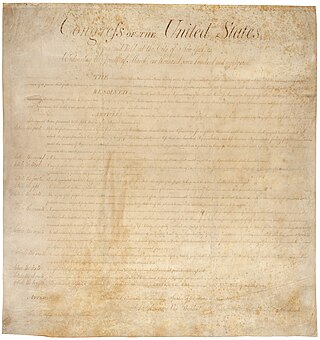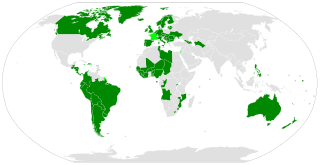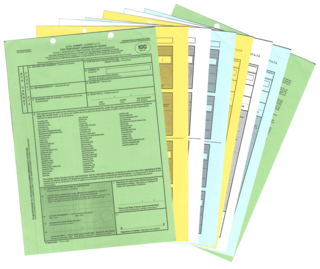
The Vienna Convention on Diplomatic Relations of 1961 is an international treaty that defines a framework for diplomatic relations between independent countries. Its aim is to facilitate "the development of friendly relations" among governments through a uniform set of practices and principles; most notably, it codifies the longstanding custom of diplomatic immunity, in which diplomatic missions are granted privileges that enable diplomats to perform their functions without fear of coercion or harassment by the host country. The Vienna Convention is a cornerstone of modern international relations and international law and is almost universally ratified and observed; it is considered one of the most successful legal instruments drafted under the United Nations.
The Protocol for the Prohibition of the Use in War of Asphyxiating, Poisonous or other Gases, and of Bacteriological Methods of Warfare, usually called the Geneva Protocol, is a treaty prohibiting the use of chemical and biological weapons in international armed conflicts. It was signed at Geneva on 17 June 1925 and entered into force on 8 February 1928. It was registered in League of Nations Treaty Series on 7 September 1929. The Geneva Protocol is a protocol to the Convention for the Supervision of the International Trade in Arms and Ammunition and in Implements of War signed on the same date, and followed the Hague Conventions of 1899 and 1907.

Customs is an authority or agency in a country responsible for collecting tariffs and for controlling the flow of goods, including animals, transports, personal effects, and hazardous items, into and out of a country. Traditionally, customs has been considered as the fiscal subject that charges customs duties and other taxes on import and export. In recent decades, the views on the functions of customs have considerably expanded and now covers three basic issues: taxation, security, and trade facilitation.

The law of war is the component of international law that regulates the conditions for initiating war and the conduct of hostilities. Laws of war define sovereignty and nationhood, states and territories, occupation, and other critical terms of law.

The American Convention on Human Rights, also known as the Pact of San José, is an international human rights instrument. It was adopted by many countries in the Western Hemisphere in San José, Costa Rica, on 22 November 1969. It came into force after the eleventh instrument of ratification was deposited on 18 July 1978.

The Hague Conventions of 1899 and 1907 are a series of international treaties and declarations negotiated at two international peace conferences at The Hague in the Netherlands. Along with the Geneva Conventions, the Hague Conventions were among the first formal statements of the laws of war and war crimes in the body of secular international law. A third conference was planned for 1914 and later rescheduled for 1915, but it did not take place because of the start of World War I.
The Montreal Convention is a multilateral treaty adopted by a diplomatic meeting of ICAO member states in 1999. It amended important provisions of the Warsaw Convention's regime concerning compensation for the victims of air disasters. The Convention attempts to re-establish uniformity and predictability of rules relating to the international carriage of passengers, baggage and cargo. Whilst maintaining the core provisions which have served the international air transport community for several decades, the treaty achieves modernization in a number of key areas. It protects passengers by introducing a two-tier liability system that eliminates the previous requirement of proving willful neglect by the air carrier to obtain more than US$75,000 in damages, which should eliminate or reduce protracted litigation.

The Single Convention on Narcotic Drugs, 1961 is an international treaty that controls activities of specific narcotic drugs and lays down a system of regulations for their medical and scientific uses; it also establishes the International Narcotics Control Board.

The South Asian Free Trade Area (SAFTA) is a 2004 agreement that created a free-trade area of 1.6 billion people in Afghanistan, Bangladesh, Bhutan, India, the Maldives, Nepal, Pakistan and Sri Lanka with the vision of increasing economic cooperation and integration.

The Cape Town Convention on International Interests in Mobile Equipment, or Cape Town Treaty is an international treaty intended to standardize transactions involving movable property. The treaty creates international standards for registration of contracts of sale, security interests (liens), leases and conditional sales contracts, and various legal remedies for default in financing agreements, including repossession and the effect of particular states' bankruptcy laws.

Small Arms and Light Weapons (SALW) refers in arms control protocols to two main classes of man-portable weapons.

The United States Bill of Rights comprises the first ten amendments to the United States Constitution. Proposed following the often bitter 1787–88 debate over the ratification of the Constitution and written to address the objections raised by Anti-Federalists, the Bill of Rights amendments add to the Constitution specific guarantees of personal freedoms and rights, clear limitations on the government's power in judicial and other proceedings, and explicit declarations that all powers not specifically granted to the federal government by the Constitution are reserved to the states or the people. The concepts codified in these amendments are built upon those in earlier documents, especially the Virginia Declaration of Rights (1776), as well as the Northwest Ordinance (1787), the English Bill of Rights (1689), and Magna Carta (1215).

The Convention on the Reduction of Statelessness is a 1961 United Nations multilateral treaty whereby sovereign states agree to reduce the incidence of statelessness. The Convention was originally intended as a Protocol to the Convention Relating to the Status of Refugees, while the 1954 Convention Relating to the Status of Stateless Persons was adopted to cover stateless persons who are not refugees and therefore not within the scope of the Convention Relating to the Status of Refugees.

The ATA Carnet, often referred to as the "Passport for goods", is an international customs document that permits the tax-free and duty-free temporary export and import of nonperishable goods for up to one year. It consists of unified customs declaration forms which are prepared ready to use at every border crossing point. It is a globally accepted guarantee for customs duties and taxes which can replace the security deposit required by each customs authority. It can be used in multiple countries in multiple trips up to its one-year validity. The acronym ATA is a combination of French and English terms "Admission Temporaire/Temporary Admission". The ATA carnet is now the document most widely used by the business community for international operations involving temporary admission of goods.
The Convention on the association of the Netherlands Antilles with the European Economic Community is an international agreement amending the Treaty establishing the European Economic Community, with the aim of awarding OCT status to the Netherlands Antilles, which was a constituent country of the Kingdom of the Netherlands from 1954 until 2010. A full treaty revision was needed because Belgium, France, Germany, Italy, and Luxembourg wanted to add a protocol on the import of refined petroleum products from the Netherlands Antilles.

The Minamata Convention on Mercury is an international treaty designed to protect human health and the environment from anthropogenic emissions and releases of mercury and mercury compounds. The convention was a result of three years of meeting and negotiating, after which the text of the convention was approved by delegates representing close to 140 countries on 19 January 2013 in Geneva and adopted and signed later that year on 10 October 2013 at a diplomatic conference held in Kumamoto, Japan. The convention is named after the Japanese city Minamata. This naming is of symbolic importance as the city went through a devastating incident of mercury poisoning. It is expected that over the next few decades, this international agreement will enhance the reduction of mercury pollution from the targeted activities responsible for the major release of mercury to the immediate environment.
The Customs Convention on the Temporary Importation of Private Road Vehicles is a 1954 United Nations multilateral treaty. In states that adhere to the Convention, it allows individuals that are temporarily visiting a country—such as tourists or individuals on student visas—to import a road vehicle to the country duty-free.
The Customs Convention on the Temporary Importation for Private Use of Aircraft and Pleasure Boats is a 1956 United Nations multilateral treaty. In states that adhere to the Convention, it allows individuals that are temporarily visiting a country—such as tourists—to import an aircraft or pleasure boat to the country duty free so long as the aircraft or boat will be used exclusively for private use.
Customs Regulations in Thailand is a combination of requirements affecting on import and export of production across the border of Thailand. Thailand has a system of “green” and “red corridor”. “Green corridor” can be used by person transferring goods which are not subject to a customs declaration. “Red corridor” is provided for persons transferring goods which are subject to a customs declaration. For instance, goods that should be paid by customs taxes, forbidden goods or goods that required a special authorization.